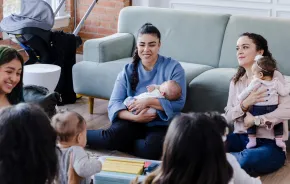OK, so you're surfing the airwaves with your remote control, trying to find something to watch with your children. And you're becoming apoplectic. What's a parent to do? As it turns out -- plenty!
Action for Media Education, based in Seattle, offers resources specifically designed to help parents and kids become media literate. Since AME (formerly known as the Foundation for Family Television) began 13 years ago, it has gained national recognition for its innovative approach to media literacy.
AME helps families make smart viewing choices, and successfully campaigned to incorporate media literacy into Seattle School District classrooms. AME also provides resources for teachers, as well as lesson plans and visual materials covering both media and health issues, plus a speaker's bureau for student classrooms and adult groups including teachers, parents, daycare providers, health professionals and activists.
In addition, AME created the annual PIXI Awards, which honor quality content in family programming. PIXI Awards have categories somewhat different from other awards shows, such as "Curiosity and Learning," "New News" and "Celebrating Diversity."
AME encourages parents and teachers to not only check out these programs, but to take the time to write a letter, send an email or make a phone call to television stations that carry terrific shows and thank them -- and then ask them to make more "good stuff." After all, stations listen when viewers talk. The downside is that sometimes no more than three people can pull a controversial show from the air. But can you imagine how parents could improve TV by turning the tables and actively campaigning for excellence? Well, AME has. And does.
Becoming media literate means using critical thinking skills that spill over into every part of our lives. As Peggy Charren, a pioneer advocate for "better TV," once observed, "If you don't like TV, you can always turn it off. But you can't turn on what isn't there."
So pick up your remote. Then AME.
Lynn Ziegler has been AME's media critic since 1991. Her book, Spongeheadz: U & MEdia will be published in 2005.
Resources
Discussing media with teens
Gloria DeGaetano, Bellevue author of Parenting Well in a Media Age and the CEO of The Parent Coaching Institute in Bellevue, offers these tips for discussing media with teens. For more information, see www.parentingwellinamediaage.com
- Be nonchalant and choose your moments such as dinnertime or when driving to soccer. She used to ambush her son, particularly in the morning when he had just poured his huge bowl of cereal, and ask a non-threatening question like "Your dad and I said that was Tom Hanks' best performance; what did you think?"
- Peer pressure to see certain movies is strong, but parents need to mediate the images, not give up when the kids are teens. Two possible solutions:
Parents take the kids to see it, and then talk about it afterwards.
Parents go first and decide if they want their kids to see it with the
condition that they talk about it together afterward. - Play the video games your kids bring home. Many parents have no idea how violent some are.
- Teens don't like to be manipulated; point out that the media is manipulating them.
Seeking teen participants
Reel Grrls, a YMCA-sponsored after-school media and technology training program that empowers teen girls to critique media images and to gain media technology skills, is seeking applicants for its February-April 2005 program.
Girls chosen to participate in the program will graduate with skills in video, audio and Web production. Students will collaborate with professional, multicultural women media artists as they explore images of women in film, music videos, fashion magazines and TV.
The program kick-off will be Jan. 29, followed by weekly 4-6:30 p.m. meetings held each Wednesday, plus Monday-Thursday during spring break (April 11-15). All meetings will be at the Metrocenter YMCA in downtown Seattle.
Each year, 70 girls go through the Reel Grrls program, which was created in collaboration with 911 Media and KCTS-TV in 2001. The goal is to give young women the skills to critically evaluate the media they are exposed to, and then empower them to produce their own media. The video work created by participants will be publicly screened through a cablecast in July 2005.
The program is open to girls ages 14-18, and applications will be accepted until the program fills. To receive an application, visit the Metrocenter YMCA or call Lucia Ramirez at 206-382-5332.
Other resources
- www.teenawareresources.org the Web site for Teen Aware, includes videos, radio ads and posters created by Washington teens. Teen Aware is a Teen Futures project sponsored by the Office of State Public Instruction and funded by the Centers for Disease Control, which uses media literacy to promote abstinence.
- www.nwmedialiteracy.org features media created by area teens and resources.
- www.teenhealthandthemedia.org a virtual meeting place by the Washington State Department of Health and Teen Futures, has a wide array of resources and links to related articles.
- www.pbskids.org/dontbuyit features media literacy information for teens as well as younger kids.
- Action Coalition for Media Education (ACME) includes free guides for parents on how to help kids become media literate and understand the persuasive power of commercials. Go to www.acmecoalition.org: Raising Media Savvy Kids and Questioning Media guides.
- The Henry Kaiser Family Foundation provides results of the several studies of children and electronic media, including a review of 40 studies that conclude children who spend the most time with the media are also the most likely to be overweight. Visit www.kff.org: Study of Entertainment Media & Health.
- Center for Media Literacy provides free materials to help educators and parents teach kids about media literacy. Go to www.medialit.org: CML's MediaLit Kit
- Nancy Blakey's Web site is loaded with project ideas to keep kids happily entertained without TV. www.nancyblakey.com
- American Academy of Pediatrics article on understanding the impact of media on children and how parents can help children make better use of the media available at www.aap.org/family/mediaimpact.htm
- National Institute on Media and the Family provides quick ratings on television shows, suggesting what ages are appropriate to watch. Visit KidScore Ratings.
- TV Turnoff Network: non-profit TV Turnoff Network provides ideas for how families can reduce or eliminate television as well as results from studies on how television impacts families. www.tvturnoff.org









